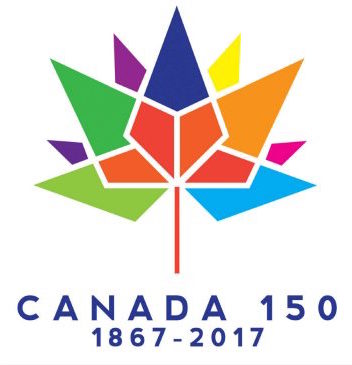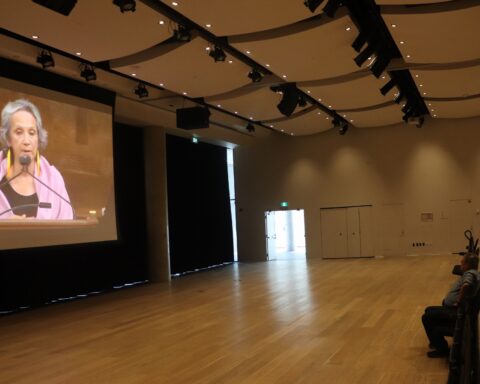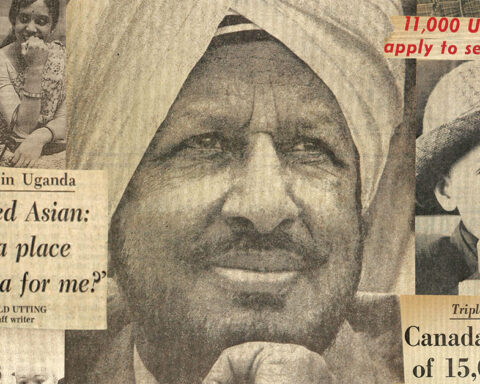The Canadian Immigration and Historical Society (CIHS) has partnered with the International Migration Research Centre (IMRC) for another year to host the Gunn Award.
The Gunn Award is a $1,000 prize given to an individual in a post-secondary institute who has written an essay on any discipline in the social sciences and humanities that addresses international migration to Canada during the post-World War Two period.
“It’s a useful contribution in understanding how communities settle in Canada,” says Gerry Van Kessel, a long-standing member of the CIHS who also sits on a board of individuals that determine the best-written paper.
Van Kessel says that the Gunn award is not just a competition on a well-written essay; it’s also an opportunity to increase the knowledge of people living in Canada about the history of their country.
“This is a part of the process of how people understand and become more aware of the events that surround them. It helps them know stories and events of those that came and made a difference in this country, and those who were instrumental in getting immigrants into this country.”
The post-war period and resettlement efforts
The post-war period of immigration to Canada marked a peaceful change in the country, as many regulations were set in place to welcome refugees. Due to a labour shortage Canadians began admitting thousands of displaced persons. Among the displaced persons were Jewish Holocaust survivors.
In 1978, Canada enacted a new Immigration Act that, for the first time, affirmed Canada’s commitment to the resettlement of refugees from oppression; that is, persons who have a well-founded fear of persecution in their country of citizenship. Admission of refugees officially became apart of Canadian immigration law and regulations.
Van Kessel sees the award as an opportunity to increase the knowledge of people living in Canada.
Past winners of the Gunn Award have detailed several aspects of the Award in their essays and agree that these historical stories are essential in providing knowledge of Canadian culture.
“Canada is one country that attempts to embrace this diversity through the ethic of pluralism,” says Alyshea Cummins, who wrote the 2011 winning paper on the Ugandan Ismaili Muslim resettlement.
“In order for this ethic to manifest, it is not only important to promote a culture of understanding, but to also become literate of the diverse histories and experiences of our collective and diverse communities,” she says. “The CIHS and IMRC assist in fostering this culture of understanding and literacy of diversity.”
Writing on personal experiences
Geoffery Cameron, a recent winner, wrote his 2014 paper on the The Political Origins of Refugee Resettlement Policy. As a member of the Bahai community and religion, he says that the topic of immigration has always been important to him.
“I had a lot of friends growing up whose parents came to Canada as refugees, because after the Islamic revolution in Iran around 1979, the new government really targeted Bahais and wanted to get rid of them. So many fled Iran,” explains Cameron.
“Canada is one country that attempts to embrace this diversity through the ethic of pluralism.”
He continues, “Canada was the first country to accept them and resettled several thousands of them. So I had a lot of friends who fled the prosecution and that gave me a personal perspective on the importance of refugee policy to protect refugees.”
Cameron also said the Gunn Award allows Canadians to acknowledge how far back the tradition of accepting refugees goes.
“The tradition goes back to post World War Two. [It] is actually a humanitarian policy that has sources in the advocacy of community groups, political will from the government and bureaucrats who believe in accepting refugees and can see the benefit in doing so.”
Importance during today’s refugee crisis
Canada’s Liberal government’s has promised to accept 50,000 Syrian refugees into Canada by the end of 2016 due to the country’s civil war that broke out March 2011. Since this decision, many have questioned why Canada opened its doors.
Jenna Hennerby the Director of IMRC, says that it’s because people are unaware of how long Canada has been partaking in accepting refugees.
She says that the history of immigration in comparison to how we responds to refugees currently is not something people are aware of, and she wants to encourage Gunn Award candidates to speak on it.
People are unaware of how long Canada has been partaking in accepting refugees.
“We really want to get students to think in parallels. They might want to think about the way Canada has responded to the Syrian refugees right now in comparison to the Islamic Ugandan refugees in 1972,” says Hennerby.
“I hope students can compare Canada’s responses to refugees and look at the ways Canada has been involved through its visa offices, foreign and immigration policy. It’s such an important area to follow up on.”
Potential essay topics
Hennerby also said she looks forward to seeing some essays written on the 50th anniversary of the Seasonal Agricultural Workers Program, a call on the Canadian government to finally allow migrant farm workers in Canada to access Permanent Immigration Status
Van Kessel says, regardless of the content, he finds pleasure in reading the essays because it assures him that what the CIHS doing is working and that immigration continues to be a large part of what makes Canada beautiful.
“Immigration has made us what we are, I’m certainly convinced of that and so an understanding of all aspects of immigration helps people become more aware of that”
The deadline for Gunn Award essay submissions is May 31st 2016. To see more details on how you can submit your essay to the CIHS and IMRC visit www.imrc.ca/category/gunn-award/





